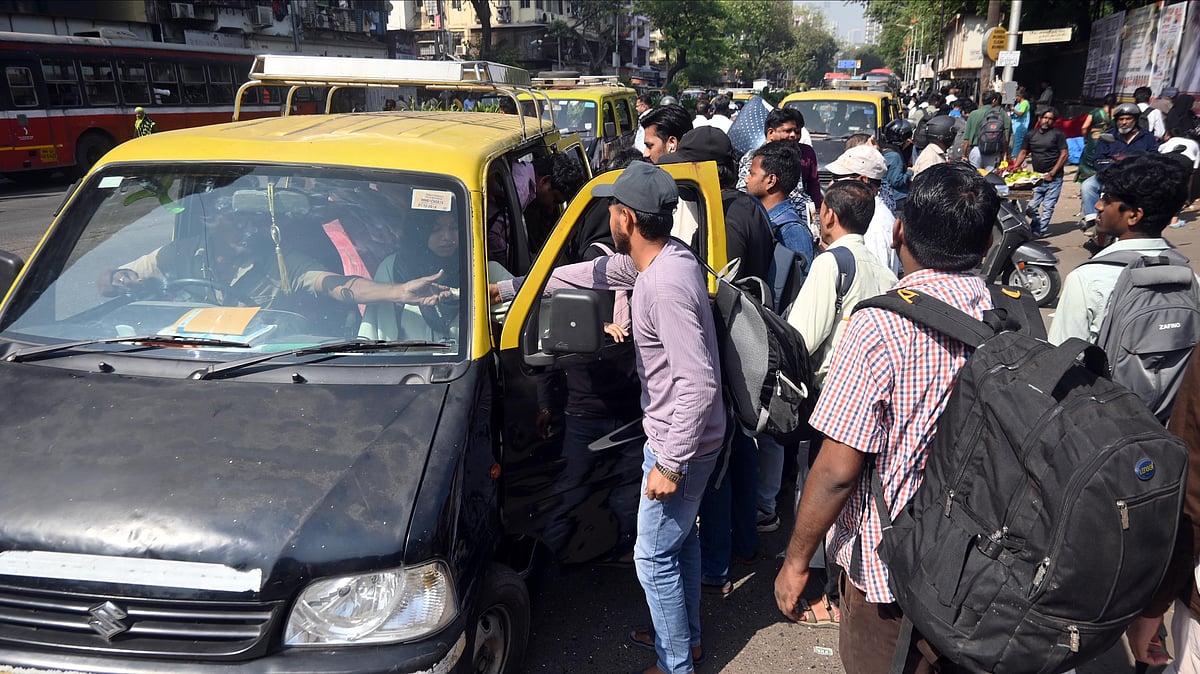CNG Supply Restored After Two-Day Disruption Brings Mumbai To A Standstill
The issue began on Sunday afternoon when third-party damage to the main GAIL gas-supply pipeline inside the RCF compound disrupted supply to MGL’s City Gate Station (CGS) in Wadala.

Long queues for buses and taxis as CNG disruption brings most vehicles in Mumbai to a halt. | FPJ/ Vijay Gohil
Mumbaikars finally received some relief on Tuesday evening as CNG supply was restored at pumps across the city. The disruption, which lasted for two days, caused widespread inconvenience to commuters, with long queues at pumps and many autos and taxis going off the roads.
Pipeline Damage Triggered Massive Fuel Shortage
The issue began on Sunday afternoon when third-party damage to the main GAIL gas-supply pipeline inside the RCF compound disrupted supply to MGL’s City Gate Station (CGS) in Wadala.
This led to a severe shortage of CNG, affecting more than 500,000 auto-rickshaw drivers, 60,000 taxi drivers, and thousands of private CNG vehicle owners in the Mumbai Metropolitan Region (MMR).
MGL Confirms Restoration of Supply
“The rectification work of GAIL’s damaged main gas pipeline in RCF Trombay premises has been completed and gas supply to MGL’s City Gate Station (CGS), Wadala, by GAIL has been restored. The gas supply to the affected CNG stations in Mumbai, Thane and Navi Mumbai has been restored. Restoration of gas supply to affected industrial and commercial customers is in progress,” read an official statement issued on Tuesday by MGL.
Morning Chaos: Long Queues, Empty Roads
Earlier on Tuesday morning, Mumbai’s CNG crisis deepened, with long queues snaking out of fuel stations across the city as supply disruptions continued to frustrate motorists.
With CNG supply disrupted in most parts of the city, around 70% of CNG vehicles were off the roads, causing major inconvenience to office-goers, students, and daily commuters. Many struggled to reach their destinations and were forced to rely on bike-sharing or carpooling services. Bike-taxi operators reportedly hiked fares sharply, taking advantage of the situation.
Drivers Face Hours-Long Waits
Taxi and auto-rickshaw drivers were the worst affected, with wait times stretching to three to four hours, compared to the usual 15–30 minutes.
"I've been waiting in the CNG pump queue since 4 am and I still don't know when my vehicle will be refilled, as there are scores of taxis ahead of me," said Rajendra Singh, a taxi driver.
Some app-based cabs temporarily switched to petrol, but most black-yellow taxis many of which removed petrol options to reduce maintenance costs had no such alternative and were forced to halt operations, dealers said.
Fare Hikes Add to Commuter Woes
After the pipeline rupture caused a drop in CNG pressure across MGL's network, several auto and taxi drivers who managed to refuel began charging two to three times the usual fare. App-based cab operators also increased their rates, leaving passengers with limited choices.
Many commuters expressed anger over the inflated fares.
"I was charged Rs 150 for a 2 km ride that usually costs Rs 40," said Sujan Singh, a passenger from Ghatkopar. "I had no choice but to pay because there were no other options available."
ALSO READ
City Roads Deserted as Autos Withdraw Services
According to a rickshaw union leader, drivers began withdrawing from the roads by Sunday night. By Monday, the city’s auto-rickshaw fleet had thinned to such an extent that several areas appeared as if under curfew.
Outside the few operational pumps, long, unmoving queues of autos stood for hours. Drivers sat inside their vehicles tired, anxious, and resigned waiting for their turn to refuel.
RECENT STORIES
-
-
-
-
-